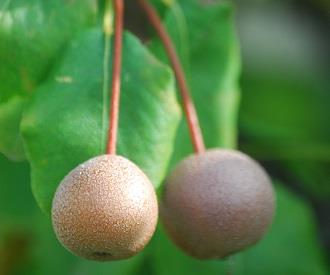Autumn 2025 / Winter 2026 seasonWe still have plenty of trees left for the winter planting season, but it is best to order ASAP.
Keepers NurseryThe UK's largest range of fruit trees
Tel. 01622 326465
Plymouth Pear

A rare pear species, Pyrus cordata, bares very small fruits like a crab apple.
Origin: Devon UK,
Pollination: Plymouth Pear is self-sterile and would require a pollinator to produce a crop.Find pollination partners >
British-grown  All our bare-root trees are personally hand-grafted by our Nursery Manager and grown on at our nursery in Kent. We have Defra and Plant Healthy certification.
More ...
All our bare-root trees are personally hand-grafted by our Nursery Manager and grown on at our nursery in Kent. We have Defra and Plant Healthy certification.
More ...
History and description of Plymouth Pear
The Plymouth pear is an unusual and rare species of pear, distinct from the common European pear. Small numbers of these trees are found growing in hedgerows in Devon and Cornwall, and have been known since the late 19th century. Other populations have been found in north-western France and north-west Spain. The geographical spread suggests the species arose before the end of the last Ice Age, when England and France were still connected.The pears are small, borne on long stalks, and not palatable, although popular with birds. Cropping is very light. The blossom has a rather unpleasant scent.
Despite the apparent lack of of fruitful qualities the Plymouth pear is of interest because of its unusual history, and the fact that it hybridises readily with other pear species.
The Plymouth pear trees we supply are grafted (i.e. cloned) to order on size-controlling rootstocks. The grafts are taken from our mother tree which is about 25 years old. Unfortunately we cannot supply seeds, or seedling trees, or scion material. However the Plymouth pear trees we produce can be used for cross-fertilising with other Plymouth pear trees or other pear species.
Characteristics of Plymouth Pear pear trees
| Use | Dessert |
| Colour | |
| Flavour | |
| Fruit size | |
| Picking time | |
| Season of use | |
| Tree vigour | Moderate |
| Tree habit | |
| Fruit-bearing | Spur-bearer |
| Cropping | |
| Pollination date | 0 |
| Pollination group | |
| Self-fertility | Self-sterile |
| Pollinators | Pollination partners |
Varieties you viewed